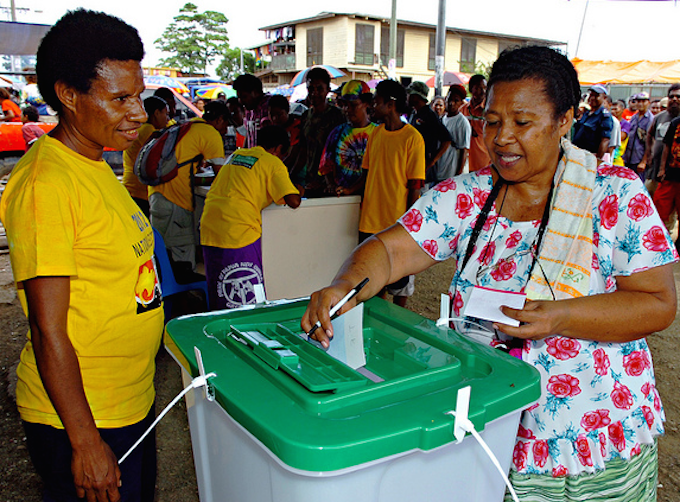Pacific Media Centre News Desk
Polling in Papua New Guinea’s 2017 national election begins this weekend.
On Saturday, voters will take to the polling booths after a six-week campaign which began on April 24.
“Anticipation” and “excitement” is the current general feeling, Papua New Guinean citizen and AUT doctoral candidate Stephanie Sageo-Tapungu told 95bFM’s weekly Southern Cross radio programme on Monday.
“Everyone is now thinking about who they’re going to vote for, how they’re going to go about it.”
 But as voting looms, however, the effectiveness of candidates’ campaigns remains unclear due to an apparent lack of funding.
But as voting looms, however, the effectiveness of candidates’ campaigns remains unclear due to an apparent lack of funding.
As ABC’s PNG correspondent Eric Tlozek reported, the 2017 election campaign has been “relatively quiet” due to an “economic slump”.
Tlozek said this economic downturn meant candidates did not have the money to “splash out” on advertising.
“There is simply no money and sometimes no economic justification,” Tlozek said.
Ben Micah of the People’s Progress Party – part of an opposition coalition with Kerenga Kua of the PNG National Party, Patrick Pruaitch of the National Alliance and former Prime Minister Sir Mekere Morauta – told Pacific Beat: “The major problem confronting our country is the fact the government is broke.”
Current government ‘plague’
Micah likened the shortage of funds, issues of maladministration and corruption to a “plague”.
Sageo-Tapungu told Asia Pacific Report “these are some common issues that the candidates are campaigning on.”
Candidates in the 2017 national election are also promising to improve infrastructure – roads, bridges – in bringing services to remote communities, solve land grabbing issues and ease current violence surrounding settlements and ethnicity, she said.
This comes in the wake of Election Commissioner Patilias Gamato calling for “free and fair” elections:
“Our theme for 2017 — “Your Choice Protect our Democracy” — speaks volumes and I urge every citizen of this country to uphold the rule of law. The decision we make today affects our future and the future of our children’s children. I urge every citizen to refrain from illegal conduct and allow for a free and fair election.”
However, gender equality has also been a focus this election and a source of hope for many in PNG surrounding equal rights.
Loop PNG reported the number of female candidates standing in the current election comprised 165 of the total 3332 candidates.
Female representation question
The only province that did not register a female candidate was West New Britain, Loop PNG said.
Papua New Guinea’s 2017 national elections have seen a rise in female candidates compared to the 135 in 2012, which saw only three female candidates succeed – Eastern Highlands governor Julie Soso, Sohe MP Delilah Gore and Lae MP Loujaya Kouja.
Stephanie’s husband, Kenneth Sageo-Tapungu, told Southern Cross:
“There’s been a rise in women’s numbers, candidates, and this has in a way really changed the dynamic of the game itself and this has really challenged the existing status quo of elections and campaigns.”
However, Stephanie Sageo-Tapungu questioned whether equal participation would become a reality.
“For female representation in politics in PNG for this year, it’s encouraging to see about 165 contesting this election — that’s quite a number compared to the past years and they have a support base.
“We hope to see them be successful, but the thing is, it’s a male game in PNG … Male politicians support women’s participation in theory. In practice, that is to be seen as a reality.”
Voting in PNG’s 2017 national election on Saturday and closes July 8.












































